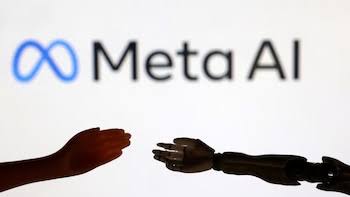Meta Platforms Inc., founded by Mark Zuckerberg, announced on December 31, 2024, its ambitious plan to integrate AI-generated users into its social media platforms, including Facebook and Instagram.
This initiative aims to enhance user engagement by introducing virtual personas to interact with real users, creating a new layer of digital communication.
Read also: Clash of the giants: Meta, Apple battle over privacy, interoperability in Europe
AI characters on social media
Meta’s strategy to attract younger audiences includes introducing AI-generated characters.
According to Connor Hayes, Meta’s Vice President of Product for Generative AI, “We expect these AIs to, over time, exist on our platforms, kind of in the same way that accounts do”.
These characters will have bios and profile pictures and can generate and share content. Since launching the tools in July 2024, the company has already created hundreds of thousands of these AI profiles.
This move responds to social media’s competitive landscape, where platforms like Snapchat and TikTok have begun utilising AI technology to engage users.
TikTok‘s use of AI has boosted user engagement, with a 50 per cent rise in views of AI-generated content. Meta aims to use AI-generated users to deepen user connections.
Read also: Meta unveils Video Seal: The new weapon fashioned against Deepfakes
Enhancing user engagement
Meta’s innovative approach raises intriguing possibilities for online interactions. These virtual personas are designed to entertain and connect with users emotionally.
Imagine getting personalised fashion advice from an AI account tailored to your style or interacting with a travel enthusiast who suggests vacation spots based on your interests.
This technology challenges traditional ideas of authenticity in social media. As AI characters become more integrated, users must learn to distinguish between human and AI interactions.
Hayes emphasised creating a more engaging experience: “The long-term goal is for these AI users to exist on the platforms in a similar way to accounts managed by flesh-and-blood people.”
This shift raises ethical concerns and potential misuse, particularly regarding misinformation and the erosion of trust in online content as Meta introduces these features.
The company asserts that all AI-generated content will be clearly labelled to maintain transparency within its user base.
Meta’s exploration into AI-generated users marks a pivotal shift in online interaction, potentially redefining social media dynamics and user expectations.
















